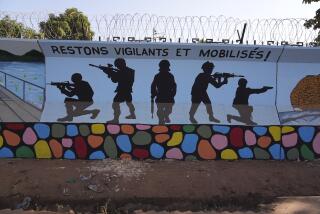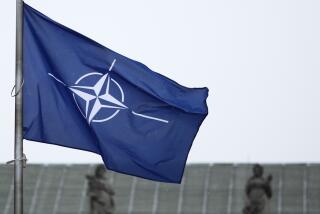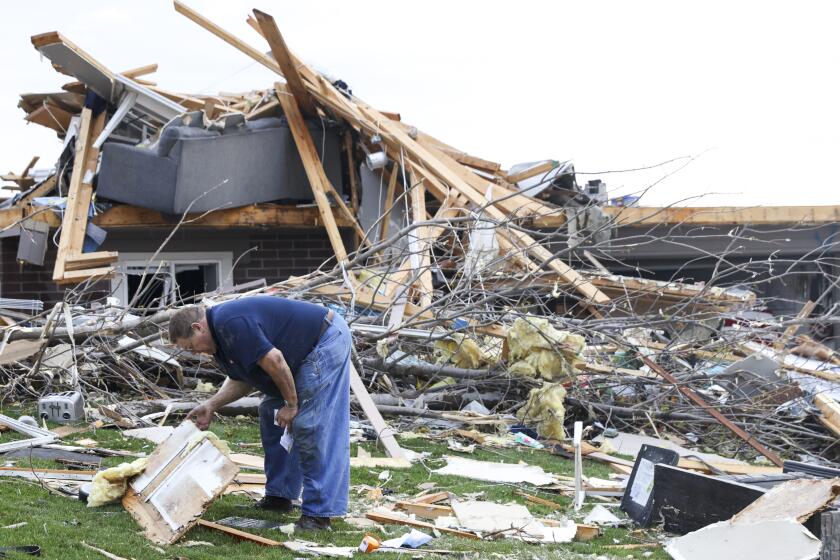NATO admits it probably hit civilians in Libya
NATO officials admitted Sunday that the alliance was probably responsible for an airstrike in a densely populated Tripoli neighborhood that Libyan authorities said killed nine people and injured 18.
The early-morning airstrike destroyed one apartment building, crushing residents beneath tons of debris while they were sleeping, Libyan authorities said. Half a dozen other homes on the normally quiet street were also damaged.
NATO said “there may have been a weapons system failure which may have caused a number of civilian casualties.” A military missile site was the intended target of the air raid, NATO said, but “one weapon” apparently went astray.
“NATO regrets the loss of innocent civilian lives and takes great care in conducting strikes against a regime determined to use violence against its own citizens,” said Canadian air force Lt. Gen. Charles Bouchard, commander of the Libya campaign. Investigators were still “determining the specifics of this event,” Bouchard said.
Despite repeated Libyan government allegations of bomb-related carnage, this marked the first time the North Atlantic Treaty Organization acknowledged culpability for civilian deaths arising from its 11-week bombing campaign over regime-controlled territory. NATO is bombing Libya under the authority of a United Nations Security Council mandate to protect civilians during the rebellion against Moammar Kadafi’s more than four-decade rule.
Late Sunday, Kadafi sent a message to all members of the U.N. Security Council, holding them responsible “for this methodical extermination process,” the state news agency Jana reported.
The Libyan government — keen to capitalize on the public relations value of a NATO mistake — bused international journalists to the bomb site early Sunday as victims were still being pulled from the rubble.
Journalists, whose movements are tightly controlled here, were later taken to a hospital to see five of the dead, including two children — one a 9-month-old girl clad only in her diapers. Later Sunday, journalists were again brought to the bomb site.
NATO’s mission has morphed into a protracted campaign despite early assertions that the effort would last “days, not weeks,” in the words of President Obama.
The mission began with a U.S.-led alliance of Western nations on March 19, but NATO assumed control March 31. Its planes have relentlessly attacked Libya, raining tons of bombs and missiles on targets.
NATO has denied trying to assassinate Kadafi, though his compound has been repeatedly hit and Libyan officials say his son and three grandchildren were killed in an April bombing.
After more than 11,500 NATO sorties, Kadafi’s government still maintains control of the capital and much of western Libya. Rebels hold sway in the eastern third of the nation and several pockets in the west.
Libyan officials said Sunday’s raid demonstrates how the stepped-up NATO air campaign is recklessly targeting civilians, perhaps in a desperate bid to sow popular discord with Kadafi.
“We have noticed that NATO’s aggression is taking a completely different turn,” said Musa Ibrahim, chief government spokesman, who alleged that cases of civilian casualties had gone from “collateral damage” to “direct hits.”
Libya’s foreign minister, Abdelati Obeidi, called for a “global jihad” against “the oppressive, criminal West.” Libya was not calling for attacks on Western cities, Ibrahim later clarified, but resistance to NATO’s campaign against Libya.
NATO denies targeting civilians and says “every mission is planned and executed with tremendous care to avoid civilian casualties,” according to a statement Sunday.
But alliance officials have charged that the Libyan government is using civilian facilities, including mosques and children’s parks, to camouflage weaponry such as mobile rocket launchers. The regime has also switched much of its motorized force from tanks and armored vehicles to pickups that are harder for NATO to pick out as military targets, the alliance said.
Sunday’s bombardment occurred in the mostly middle-class Arada Street neighborhood of the sprawling Souk Juma district, one of Tripoli’s most populous.
The neighborhood has been a hotbed of opposition to Kadafi, with reports of sporadic clashes and armed attacks on police checkpoints.
Neighbors milled about the wreckage of the devastated, three-story residence, which, they said, was not near any military installation. Several people said they had heard aircraft and a whistling sound before the blast.
“I was standing outside, smoking a cigarette, when all of a sudden there was a huge blast and I was thrown backward,” said Fakhri Bishara, 23, who lives across the street and suffered leg wounds. “I want to ask NATO: ‘How is this protecting civilians?’”
More to Read
Start your day right
Sign up for Essential California for news, features and recommendations from the L.A. Times and beyond in your inbox six days a week.
You may occasionally receive promotional content from the Los Angeles Times.






